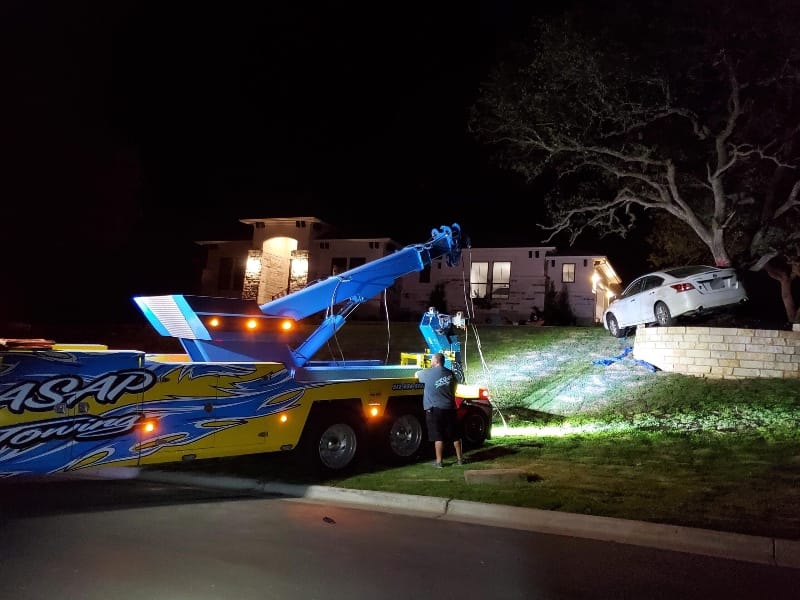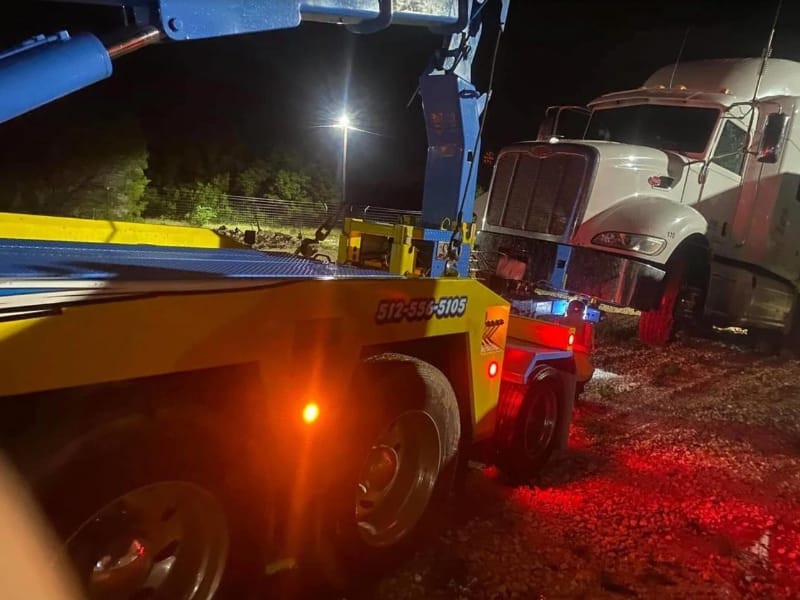The Challenges Don’t Wait for Sunrise
Towing in the daylight is one thing. But Bertram emergency towing after dark comes with its own set of rules. The road looks different. So do the risks. Our tow truck crew remains out there long after most drivers have made it home, facing visibility issues, fatigue, and unpredictable traffic, all while trying to help someone in a tough spot.

Visibility Drops. Risk Rises.
Headlights only go so far. At night, even the most familiar stretch of road can become uncertain. One missed detail can change everything. That’s why our approach during overnight calls is cautious and calculated.
Low visibility affects more than just how we drive, it shapes how we work. We can’t always spot fluids on the road or see under a vehicle clearly without additional lighting. Everything takes longer because we double-check every step.
To stay safe and effective during Bertram emergency towing calls at night, we:
- Set up strong portable lighting to illuminate the work zone.
- Wear reflective gear to stay visible to passing traffic.
- Mark the perimeter with cones and flares to prevent secondary accidents.
Less Traffic Doesn’t Mean Less Danger
It’s true that the roads are quieter after dark, but quieter doesn’t mean safer. At night, we see more drivers who are speeding, distracted, or impaired. And they don’t always see us in time.
That’s why our truck placement during nighttime calls is strategic. We don’t just park and work. We use the truck itself as a shield, giving us space from the flow of traffic. We stay in contact with each other through radios to stay alert on curves and blind spots.
Equipment Can’t Fail
There’s no room for error with gear during a 2 a.m. call. If our winch fails or a strap breaks, it’s not just inconvenient, but outright dangerous. That’s why we inspect everything constantly. Night towing puts more stress on our equipment, and we never assume that something “worked fine yesterday” is good enough tonight.
The stakes are higher when you’re handling Bertram emergency towing in the dark. If something goes wrong, help isn’t five minutes away. So, we bring backup gear, test our systems more often, and stick to a strict maintenance schedule.
Why It’s a Different Kind of Call
Night towing changes our thinking. We move slower, observe more, and expect the unexpected. A routine tow at noon might take 15 minutes. That same job at 1 a.m.? It could take twice as long, not because we’re being slow, but because we’re being careful.
Night shifts are built on trust. Trust in each other. Trust in our trucks. Trust that the traffic sees us in time. Every Bertram emergency towing call at night is a test of focus, discipline, and preparation.
Bertram Emergency Towing FAQ: Night-Shift Safety & Service
1. Why is towing at night more challenging than in the daytime?
Darkness reduces visibility for both tow crews and other drivers. At night, hazards such as leaking fluids, debris, or uneven shoulders can be harder to spot. Tow operators work more slowly and methodically to keep everyone safe.
2. How do tow operators stay visible during night calls?
Professionals use:
- High-powered portable floodlights to light up the work zone
- Reflective jackets, gloves, and helmets to be visible to traffic
- Cones, flares, and LED triangles to mark the perimeter and warn approaching drivers
3. If there’s less traffic at night, why is it still risky?
Night driving often involves faster speeds and more impaired or fatigued drivers. Even with lighter traffic, the risk of being struck roadside is higher — so tow truck placement and lighting are critical.
4. How do crews protect themselves from passing vehicles during roadside work?
They park the tow truck at an angle that acts as a barrier between the disabled vehicle and oncoming traffic. They also stay in radio contact with teammates to watch blind spots on curves and low-lit shoulders.
5. What happens if equipment fails during a nighttime tow?
A failed winch, strap, or light can become a serious hazard in the dark. Reputable operators like ASAP Towing:
- Perform frequent equipment checks and maintenance
- Bring backup gear for every night-shift call
- Stop work immediately if any component shows signs of weakness
6. Why do nighttime tows often take longer?
Operators move more deliberately and double-check every step. A job that might take 15 minutes in daylight can take twice as long at 1 a.m. because visibility is limited and every connection must be confirmed for safety.
7. How do tow crews stay alert during long overnight shifts?
They rotate shifts to reduce fatigue, use hands-free radios to maintain constant communication, and follow strict safety protocols to keep focus high even in low-light conditions.
8. What can drivers do to stay safe while waiting for a night tow?
- Pull as far off the road as safely possible
- Turn on hazard lights and keep seat belts fastened if near traffic
- Stay inside the vehicle unless directed otherwise by responders
- Use a reflective vest or flashlight if you must exit the car
- Share precise location details (mile marker, nearest exit, or landmark) when calling for help
9. Why trust ASAP Towing for Bertram emergency towing after dark?
Because we:
- Operate 24/7, responding to breakdowns at any hour
- Use reliable lighting, reflective gear, and well-maintained trucks
- Train crews specifically for night-shift roadside safety
- Bring the right equipment and backup gear for every call
- Focus on keeping motorists, team members, and traffic as safe as possible

Bertram Emergency Towing by ASAP: Always Ready for the Next Call
At ASAP Towing, we’ve built our Bertram emergency towing team around that readiness. Not just for the day jobs, but for the calls that come in when it’s dark, cold, or quiet. Night towing isn’t for everyone, and that’s fine. But it’s part of what we do.
We stay ready for Bertram emergency towing because no one chooses when their vehicle breaks down. Whether it’s midnight or midday, we’re out there: lights on, boots down, and focused on the job. Because towing doesn’t sleep. And neither do we when someone needs help.

